#-lar eclipse collaring)
Explore tagged Tumblr posts
Text
KELLY REICHARDT’S ‘WENDY AND LUCY’
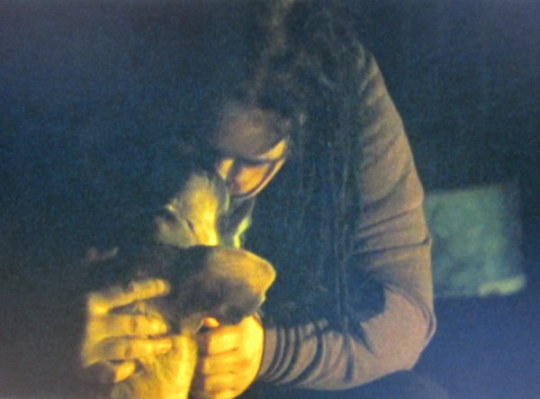
© 2018 by James Clark
The truest way to the heart of Kelly Reichardt’s film, Wendy and Lucy (2008), may turn out to be its penultimate moment. This was not always my approach, as a reading of the Wonders in the Dark blog from February 15, 2012—A Dangerous Devotion: Lars von Trier’s “Dancer in the Dark” and Kelly Reichardt’s “Wendy and Lucy”—would show. There I was intent upon engaging the protagonists of each work having risked everything (like Joan of Arc) for the sake of getting to the bottom of a dilemma unfortunately even beyond their very alert and brave powers. What, specifically, drives such souls to the brink of destruction?
There are ways of taking a closer look at the phenomenon, and Wendy and Lucyshows the way. Like Mouchette, a classic film figure under heavy fire, Wendy can no longer stand her emotionally violent, Midwestern blue-collar family and neighbors and their Rust Belt home base spanning Muncie and Fort Wayne, Indiana. Unlike Mouchette, the famous waif, she does not choose suicide as a meaningful change (nor is she destined to be immortalized by a forum of movie buffs). She hits the road with 500 dollars in savings from unspecified jobs, and a clunker supposedly capable of reaching that land of fool’s gold, Alaska. (Where others dream of gold, she—speaking volumes—dreams of a job in a cannery which, at least, does not resemble Indiana.) However, she does also bring a stunningly vast fortune in the form of her golden retriever, Lucy (a born retriever of buried treasures).
Right from the get-go we know Wendy will precipitate some kind of screw-up. Getting to that late and primary revelation mentioned above, there is Lucy in the back yard of a suburban Portland, Oregon, home, having become a foster-home for her as the upshot of Wendy’s jail time for shoplifting. (Perhaps before beginning with that end of their era together, in that tranquil yard, we should notice that, in the course of Wendy’s return to freedom she distributes posters including a photo, around the area where Lucy was last seen. “I’m lost!” the tag-line runs. When Mouchette is confronted in a forest by a figure suspicious about her intent, she defends herself by blurting out, “Lost, Sir! Lost!” The truly lost, Wendy, having found where her beloved had landed, proceeds there to confirm her incurable lostness. (And Lucy proceeds to confirm her genius.) The subversion of mainstream sentimental film reunions here is an important gift.
Wendy first sees Lucy gazing at a flock of seagulls circling her new and possibly very short-term yard. Calling out to her and saying, “You miss me, Lu?” Wendy passionately clings to the chain-link fence. Lucy forgets the seagulls and rushes to the only familiar aspect of a life having undergone a shock we never fully see, this being a remarkable hallmark of Reichardt’s narratives. “I’m sorry, Lu,” is a recognition that Wendy sees her friend as having smashed out the cliché ceiling where jerks come up smelling of roses in the hands of infinite forgiveness. “I know… I know, Lu” the wanderer emotes. But does she in fact comprehend that when, at the entrance of the grocery store she was about to rip off (after not entirely sincere calming kisses and caresses), Lucy could read her friend’s being a disappointment as spiked by, after Lucy’s desperate barking a warning, undergoing Wendy’s marching up to the leashed-secured companion, clamping down her snout and angrily telling her, “Don’t be a nuisance! I don’t need that?”
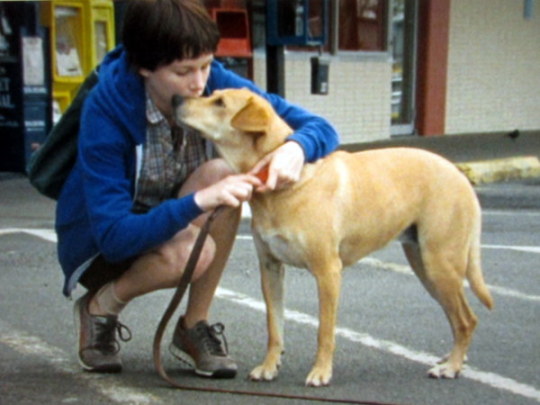
The beginning of Lucy’s painful realization that she doesn’t need the felon includes the frenzy on seeing her partner brought back to the store by a clerk and then taken away in a squad car (all the more disturbing in never seeing the back-door departure while left to puzzled and desperate staring at the front door). However, the generally supposed-to-be dull-one’s real struggle is left for us to reconstruct. As now newly composed, Lucy listens to Wendy’s solicitude and her heart is both joyous and something else, very hard to undergo. “Don’t be mad, Lu… Here, I got you this!” [a stick, to fetch]. She throws it toward where the seagulls were. “Such a good catch! Drop it! Good dog! Good girl!” Lu happily plays, with old-time and not old-time energy. (Lucy’s flagging and once prominent lodestar [with funds having dwindled by way of the shoplifting fine, the car disposal and a theft/ assault in the woods] had become a lachrymose spent force like Mouchette; while Lucy had become a form of another cinema figure—unforgettable to a choice clientele—namely, Baltazar, the donkey, carelessly regarded as “The Mathematical Donkey.”) “I’m sorry, Lu,” is followed with a defeated cry. “I lost the car…” comes next, followed by the rather hasty, wishful thought, “That man seems very nice…” Suddenly it’s, “You be good… I’m gonna make some money, and I’ll be back! OK, Lu, be good…”
How good Lucy could be in face of that collapse requires inference about how she weathered the abandonment. After Wendy’s release, she looks for Lucy at the pound. Though she comes up empty, we can imagine her dog going through the fear and depression seen in all the inmates on hand. We can imagine Lucy’s sense of being ripped away from not only a person of great interest but the infrastructure by which they had been sustained. Missing the interpersonal love intrinsic to that stemming would not be the end of Lucy’s heavy reflections. The moment of their kiss and caress through the fence out in the suburbs, fathoming how much is left and how much is gone, offers a wider range of action whereby other entities (seagulls, for instance; and the sea itself) offer creative love more resilient than that of Wendy.
From that perspective, accessible only to those who, with passions unstinting, beat back lostness, Wendy’s way of concluding the interplay is far more breathtaking and chilling than any gun battle. The intensity of this kinship should not be allowed to filter down as a sentimental highlight of melodramatic, advantage-addicted presences bending to the dubious powers of physics, religion and morality. Wendy, by and large, seems common and flighty. But, as we are about to investigate and define, her awkwardness and suspicion (and responsiveness to generosity) stem from an aristocratic spell. She does not cherish many others of her species for the very good reason –but too bluntly rendered—that they are far more remote from her energies than Lucy.
In the subsequent Reichardt film, Meek’s Cutoff (2010), Emily (played by actress, Michelle Williams, who also puts Wendy on the map) sees her real world shrink to one American Indian heading for the hills without her. She had considerably come to the point of being enraptured, from which to chart a difficult and seldom seen course. Here it is Lucy who sustains what Emily is about to undergo, while Wendy more closely approximates Emily’s game but uninspired husband, Solomon. While Wendy was spinning her wheels to little effect, Lucy was bringing lucidity to the matter, lucidity in the sense that effective love requires effective hate. That shocker, in the context of a sweet pup, requires incisive explanation. Creatures great and small, as our film makes efforts to highlight, find themselves intent upon many objectives. But their most remarkable action, namely, participating along with creativity itself (mustering the energy to complete its presence) is not widely accomplished among humankind. Wild creatures, including pets more fluent with carnality and its paradoxes, put together far better numbers of this sort. Though much of the world’s humans hunker down in finalities seeming to them consummate, from the perspective of that other way (being about kinetic coordination, rather than a stand) there comes to pass a state of impasse massively hindering forward momentum. By the same token, wild creatures (including some humans) feel at war; but also—through agencies of daring and reflection—a kind of peace. As the reservoir of coming to grips with impasse veers to more sanguine areas, there is the possibility of oscillating overtures amongst the options, especially in the syntheses of blithe percolation, increasingly putting heat on the opposition by attractive ways careening (like happy wolves) as part of a delicate wolf pack. Thereby, the problematicness of such a pragmatic inertia, never to be dislodged, can paradoxically flourish in ways integral to a cogent primordiality.
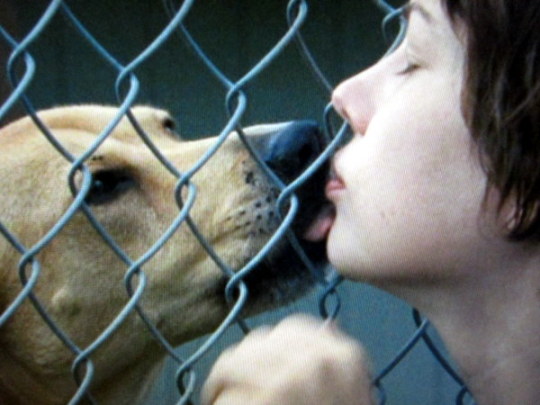
The power of the scene where Lucy and Wendy go their separate ways derives from that unique, compelling infrastructure. Such a smash-up, between those who have travelled where so many haven’t, elicits a post-mortem (where no one has actually died) for the sake of casting light upon a skill with consequences far beyond domestic viability. When it comes to breathing down Wendy’s neck to discern what’s the matter, we can begin by availing ourselves of Reichardt’s previous film, Old Joy (2006), where a couple of incompatible guys waste the beauties of rural Oregon and spend a bonfire night worsening their intrinsic depressiveness. In the course of Wendy’s joyless playing fetch-a-stick with Lucy where we first see them along a forested path in Oregon, the retriever stumbles upon a tribe of runaways spending the night around a bonfire. Actor, Will Oldham, who, in Old Joy, joylessly goes through the motions of play with the dog of the hour—Lucy, in fact—comes back to haunt Wendy and Lucy as once again a nocturnal presence proud of making a statement against those who work with a will. A (strategically significant) responder to Lucy’s neglect—an unwashed young girl with a large ring through one nostril and looking more affectionate than Wendy—readily becomes the leading light, eclipsing the loudmouth (Icky), though another boy, weighted down with a sense of his own errancy, also outperforms the medicine man. Wendy eventually comes into the picture, a picture of wanting to be somewhere else. She—a mixture of shyness and mistrust—divulges her travel plan, which prompts Lucy’s new friend to call out, “Hey. Icky, this lady’s going to Alaska!” That sets off Wendy’s having to hear the know-it-all recommend a company to work for (later we see her jotting down the particulars), without any recognition that she has anything in common with him. Increasing the alienation is Icky’s follow-up boasting about totaling a two-hundred-thousand-dollar earth mover there, when stoned, of course (Oldham’s playing the part of a stoner, in Old Joy). “They couldn’t pin it on me… I was gone!”) Her rather brittle body language here is a case of being all to the good and yet all to the bad. Before Lucy rushes ahead to that intriguing underworld, there is a play of twilight in the trees, smudges of vivid color—forming a dynamic incentive leaving Wendy far behind.
Following directly upon that wake-up call where a bonfire has a hard time priming Icky and Wendy toward some semblance of viability, there is Wendy’s parking her car on a quiet street; and a blurry pink figure, due to car and house lights springs, up by her window. “Sleep, girl,” she tells Lucy; but wakening is the keyword. Next morning our protagonists are wakened by a security officer, who informs her, “You can’t sleep here, Ma’am…” Almost simultaneously, a pigeon flashes skyward by that same window touched the night before. Its joining the patterns of exhortation constitutes a final bon voyage before Wendy’s limitations take over.
Her malaise and hard eyes in spying at the periphery of Icky’s campsite, before joining Lucy being treated well, bespeak more fear than alertness. The prompt death of her car (an Accord, of all things) while being told by the officer to move it sends her into an anxiety attack hardening into crude defensiveness. That same morning of ignition not happening brings the revelation that Lucy’s food bag contains 10 small kibbles. Rather than dip into her puny war chest to care for her partner, we have Lucy on a tight leash and Wendy scavenging for bottles and cans (an occupation of Oldham’s Kurt, in Old Joy). In their constriction (Lucy on the lookout for anything edible on the ground), Wendy ties her friend to a fixture at a strip mall while she goes off to a public washroom. She brushes her teeth, gives herself a sponge bath (attending to an injury at her Achilles heel) and fills a bottle with water; but Lucy does not become a beneficiary of that exercise, exposing how patently hopeless the master of rugged and woozy individualism amounts to. On the other hand, with the lady going to Alaska chewing on some nondescript scrap and Lucy at a loss to find even a scrap, their peril, pain and stoicism disclose that this is no mere folly but an enduring and profound love, however disastrous.
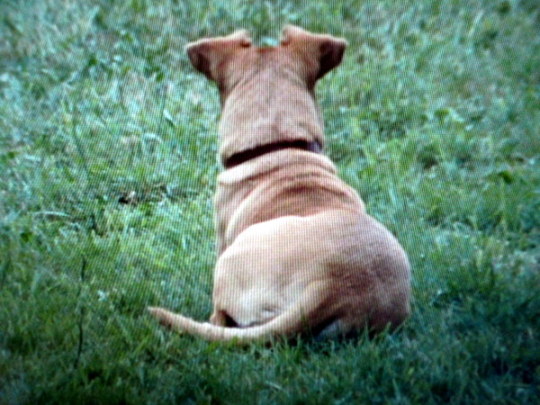
The dead car having changed a rout into a massacre, Wendy attempts to shoplift a can of I AMS (and sundry snacks), and the young stock boy who intercepts her proves to be an instance of all she hates and carelessly hopes to hide from. (The shoplifting scene in Greta Gerwig’s film, Lady Bird [2017], where two young check-out girls regard the effort as a laughable farce, seems to be more Icky than Wendy—a somewhat inadvertent underlining of how uniquely pitched our film has been composed.) The clerk may be a schoolboy part-timer, but his rhetorical apparatus, as fortified by a crucifix, comes to us as redolent of a fanatical opportunism able to override the far more rounded and easy-going manager. So well on top of her subject, Reichardt endows the moralist with a voice recalling smug Eddy in Leave It to Beaver; and also Kurt in Old Joy and Icky in our film today. Not leaving the experience with that, she shows us that Wendy herself has little trouble slipping into that murder-inciting register. “Excuse me, Ma’am? I think you’re forgetting something…” More an Inquisition than a secular mishap, Andy, the born cop, impressively hounds his boss, Mr. Hunt, who had begun with the modulated outlook, “OK, well, what are we talking about here?” Having nothing to do with grey zones, the upstanding choir boy invokes an egalitarian axiom being hard to deny. “The rules apply to everyone equally.” With the can of I Ams on the desk as Exhibit A, the clean-up drive puts forward another indubitable truth, “If a person can’t afford dog food, they shouldn’t have a dog.” Wendy, who had only too quickly put out the fabrication that she was intending to pay for the loot after checking on how her dog, tied outside, was doing (far worse, in fact, than Wendy was able to comprehend), expertly directs her smarts and phony sincerity to the generous motives of Mr. Hunt. “I’m very sorry… This isn’t going to happen again…” (The frenzy, despair and hopelessness of Lucy, on seeing her being ushered back in, comprising what we can imagine to be far from a unique error.) Andy presses on, with, “The food is not the issue. It’s about setting an example, right?” Wendy’s being as annoying a sophist as Andy kills any hope she might have had. “I’m not from around her, so I couldn’t be an example…” This brings Hunt to say, “We have a policy, Ma’am.”
Film stories about troubled humans and their dogs seem to invite the clientele to an evening of strong feelings everyone can easily appreciate. Wendy and Lucyis a film far from easy to fathom. In their first walk seen together, after a rather routine fetch-and-drop ramble, Lucy upgrades to that remarkably rough-hewn young girl who, when Wendy finally catches up, tells her, “Great dog!” [greatness being measured not by looks but by another kind of presence]. Learning of her name, the nomad declares happily, “You’re a sweetheart, Lucy!” What she sees, even if she can’t begin to explain it, is depth. She asks Wendy about Lucy’s breed, not as if it matters. The question catches the owner only half-listening, “I don’t know… a mix of hunting dog and retriever…” That verbal fumble becomes one of a series of sloppy assertions in Reichardt’s films, exposing the speaker as lacking articulative grip but unable to admit any shortfall in mastery within a troubling preoccupation. (Propped upon that bemusing skid, there is the nearly magical dialectic of hunt and retrieve, the “greatness” of which Wendy misplays and Lucy embraces.) Another form of elegant and ironic composition comes our way here in the form of a reprise of hugging Lucy, this time by Wendy. On realizing that collecting empty drink containers is not going to fit the bill, Wendy, outside the grocery store, performs a preamble to theft she has repeated frequently. She, too, caresses Lucy, and Lucy, as with the person the night before not having any ulterior motives, licks her face, always having been on the lookout for Wendy being as heartfelt as herself. Why would the supposedly advanced discernment need to prepare the lower form toward passivity, unless the latter has been treated to Wendy’s dark side, again and again? (Here, once again, the Shirley Temple, Depression Era concomitants of this duo lead first only to the shattered, for the sake of harder and deeper gifts.) “Don’t bother anyone, OK?” is the remarkably cynical patter on account of providing for her dear one’s breakfast. Lucy begins to wail and swish her tail fiercely in a vain gesture to make the coming outrage devolve to some kind of creative lift. Wendy turns back in anger and scolds, “What did I say?” She clamps Lucy’s snout and we wonder at the crude hysteria by which she would suppose to attain to innovative distinction.
After paying the $50 fine, Wendy returns to the scene of the crime and the scene of the end of her partnership. The bus that drives her there (a conduit of freedom) contains an ad which runs, “It’s not too late to sleep like a baby.” That seems the right time to attend to the sizeable unemployment and poverty constituency at that moment of truth. Having scandalized so many other expectations, this film is very apt to transcend political and moral bromides. All the scavengers flocking about the bottle returns depot are unfailingly gracious. When Wendy, seeing fit to retire from that trade after an hour or so, contributes to the cache of a man in a wheelchair, he describes her generosity as “cool.” Right from that first walk, ending with Icky and associates having more in common with the scavengers than marauders, a murmuring, lullaby motif of a woman’s voice wafts over moments of promise. Accordingly, it comes to light during the first moments of her bottles pick-ups. Its maintaining a sensuous balance, where imbalance so overtly threatens, combines with Lucy’s vigorous command of emotions (and capacity to be still) to expose sleeping-like-a-baby inertia as decadence, not accomplishment. Wendy, for all her gross incompetence, has had the drive to leave Rust Belt Fort Wayne. But choosing an extravagant (“cool”) destination she clearly cannot afford, from the points of view of money and maturity, leaves her floundering in distraction and melancholy similar to the casualties of the defunct saw mill which pushed a modicum of self-confidence to the total loss of such a state. (There is a startling and thrilling cinematic delivery apropos of this vale of anxiety. The district repair shop is closed for Sunday and a dispirited Wendy cups her hands to the shop’s window to see its interior free of reflection. In Mark Romanek’s Never Let Me Go [2010]—where a “Miss Lucy” is fired from her teaching job for siding with school children having been being bred for body parts—the schoolgirl protagonist and her friends cup their hands to a travel bureau window in order to ascertain that an employee within is the mother [the “origin”] of the doomed protagonist.)
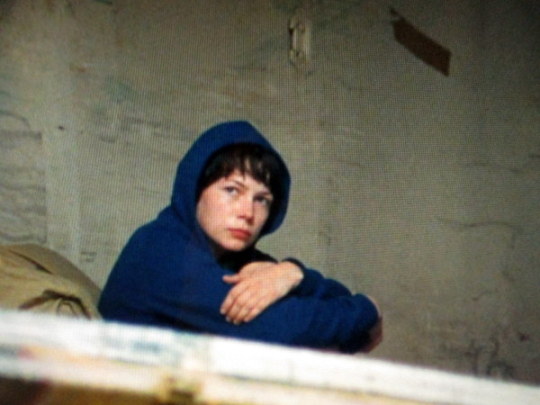
Two other fixtures of that Portland exurb are the grandfatherly Walgrens parking lot minder who is mindful of Wendy; and a demented, self-pitying and rather far-seeing thief who steals about half of her meagre liquid assets. The man who said a mouthful when he said, “You can’t sleep here, Ma’am,” does in fact demonstrate alertness to Wendy’s predicament and that of those meek undead. Though he never deals with Lucy, the parking monitor functions in this distressed-dog movie the way Edmund Gwenn calms the maelstrom in Lassie Come Home (1943). Here, once again, good-will folk wisdom and cliched expectation in the foreground are no match for that nature in the background which Reichardt knows to be paramount. In response to Wendy’s counting on the local pound to eventually produce a Lucy Come Home, the Gwenn figure recommends the more active strategy (seemingly proven in his family history) of leaving on the ground items of her clothing to induce the missing loved-one to the happy fate befalling Lassie. Her departure from him includes his gift of a few dollars, all he can spare on a minimum wage salary, while making sure his granddaughter (having a body language in league with Andy) doesn’t see what is transpiring. (Just before that, we found Wendy angrily stalking about, demanding Lucy to appear and stop spoiling her excellent life. She catches up with Andy, being picked up by his mother after work, and punk-style, howls, “Have a great night, OK? Your son’s a real hero! [“Lucy! Come now!”].) A sweetheart, like Gwenn; but careful not to disrupt mainstream family priorities. Gwenn’s independence as a tinker provides food for thought. Waiting for news of Lucy, Wendy—perhaps feeling the need to do justice to the greenery she has denied herself—thinks to spend a night in the forest nearby the train tracks, where a golden patch of foliage only slightly steadies her. But her bid for bracing solitude exposes her to, like so many other of her overtures, a down side of the open road. The soporific aura of that hard-luck, wrong-side-of-the-tracks constituency seems to confirm her assumption that risk inheres in a field readily and quite pleasantly consumed. With her elderly friend (spending numbing days standing on the dead cement, and counting it a great improvement over his previous all-night job), she hears him declare, “It’s all fixed!” [needing a job to find a job]. “That’s why I’m going!” [to another type of numbing]. Suddenly highlighting the meaning of true risk is a predator who tells her, “Don’t look at me!” as he loots that portion of her money she hasn’t kept in her money-belt. The real plus of this episode consists in the sociopath very closely seeing-eye-to-eye with Wendy. “I don’t like this place… It’s the fuckin’ people that bother me… I’m out here trying to be a good boy, but they don’t want to let me… They treat me like having no rights… They can smell the fear… Fuck! I killed more than 700,000 people with my bare hands! Fuck if I know!”
“They can smell the fear,” is a brief sentence presiding over many horrific missteps. (Lucy can smell the fear.) In the aftermath of the car trouble, Wendy calls back to Indiana and her sister and her sister’s husband, on the vague supposition they might be interested in her troubled life to date. The far more sanguine husband picks up the call and kindly listens about the end of the vehicle. “It’s kinda bad here, actually…” “What does she want us to do about that?” the sister loudly asks, being like one of those the invader imagines killing with his bare hands. Wendy comes back with, “I don’t want anything,” [from the likes of you]. But countenancing the likes of her—and him—makes, as Lucy knows, more sense than going to Alaska. As with the complaining mugger and the whole town, it seems (and maybe the whole planet), vividly addressing sleeping babies seems to be a forgotten, or perhaps never found, skill. (Andy’s rabidity being merely a variant of falling prey to a gigantic creative exigency no one wants to pay the cost of.)
Lucy, on the other hand, has shown us what succeeding-to-thrive looks like. (A recent Time magazine expose, of the very smart and the very workaholic hogging material wealth, prescribes ways of letting others in on that rational advantage binge. That would be way down the track where Lucy thrives.) Wendy hops a freight going North, and as she slouches on the floor with a scowl on her face she looks out at the countless conifers (the most primordial trees), pulled along like toffee, into a mysterious weave by the speeding train. Lucy, too, is carried along, by the vicissitudes of foster care. Wendy is crushed by the countless obstacles. Lucy, by her own lights, knows of a fluid, mysterious range she is acute enough to recognize as being her real home. Lucy Come Home.
0 notes
Text
30th Wedding Anniversary From The Waterboys.
If you're able to use a computer and also may review this email list, you'll have no doubt became aware of worldwide warming. Afterthought: A number of various other Swedish films in and around the horror style are actually Jan Molander's Female in a Coat Coating (Kvinna i Panthera Pardus, 1958), Lars-Eric Kjellgren's Hidden in the Fog (I dimma dold, 1953), Rolf Husberg's Moon Over Hellesta (Moln över Hellesta, 1956). ESSENTIAL ASSISTANCE: There is actually no environment (level of safety gasolines neighboring a wandering physical body) on the moon. Our team must feature existing concept of exactly how deep space, the galaxy, the solar system, the planet as well as other earths, and the moon happened. Look, I am actually the man which calls The Dark Knight the describing post-9/ 11 movie Yet Burden's couple of apparently cutting edge pep talks are actually hazy and also unclear while his actions (utilizing ran away captives as his private soldiers) are that of any kind of super-villain. FAKING reaching the moon ... all those hundreds of hours of online videos, from lunar rovers hopping over the landscape, of the online video above from that individual dropping in a way you cannot do on earth ... virtually inconceivable. Contrast that along with each Beauty trip, where one unhappy astronaut needed to continue to be responsible for to pilot the pill while the others prepare shoe on the moon. A series that looks at eclipses, meteor downpours, dusks, daybreaks, moon periods, eco-friendly flashes, blue hrs, clouds and various other phenomenon viewed overhead. Considering that the sea is thus dark at that degree, the shark counts and possesses very small eyes on its own additional senses to search. Travelers, white-collar worker and few crowded the Hong Kong waterside as the supersized moon rose over the high-rise buildings from the economic hub, while in the Chinese capital Beijing the moon climbed stunningly over the urban area's horizon. This year the moon will certainly be on the polishing crescent approaching its first quarter. Baseding on the new idea, moon-formation begins at the very upper hand of a planetal band, where a breakable child moon can start to surface without the danger of being actually torn apart by tough gravitational force of its moms and dad earth. No person would like to be the child who needed to put on galoshes over his road shoes, you had to have boots - and heaven forbid they were actually moon footwear (keep in mind those?). These effects take place considering that the extremely last bit of the Sunlight's photosphere, or even area, is beaming by means of the valleys and craters of the Moon.
To observe the moon and superstars as similar hard drives, some myopic observers need to have just eliminate their glasses. Regarder coat Night from the Dark Full Moon gratuitement, Voir coat Evening from the Darker Full Moon en streaming vf, Telecharger layer Night of the Dark Full Moon en entier, Regarder layer Evening from the Black Moon en francais. By peering into the fog of Saturn's huge moon Titan, researchers can find out more regarding how the settings from unusual planets behave. When your youngster is actually enjoying with moon footwear ... some discoloration as well as abrasion could develop. You may constantly have coatings off, but this is actually far more tough to include all of them when you are actually presently cold.
0 notes